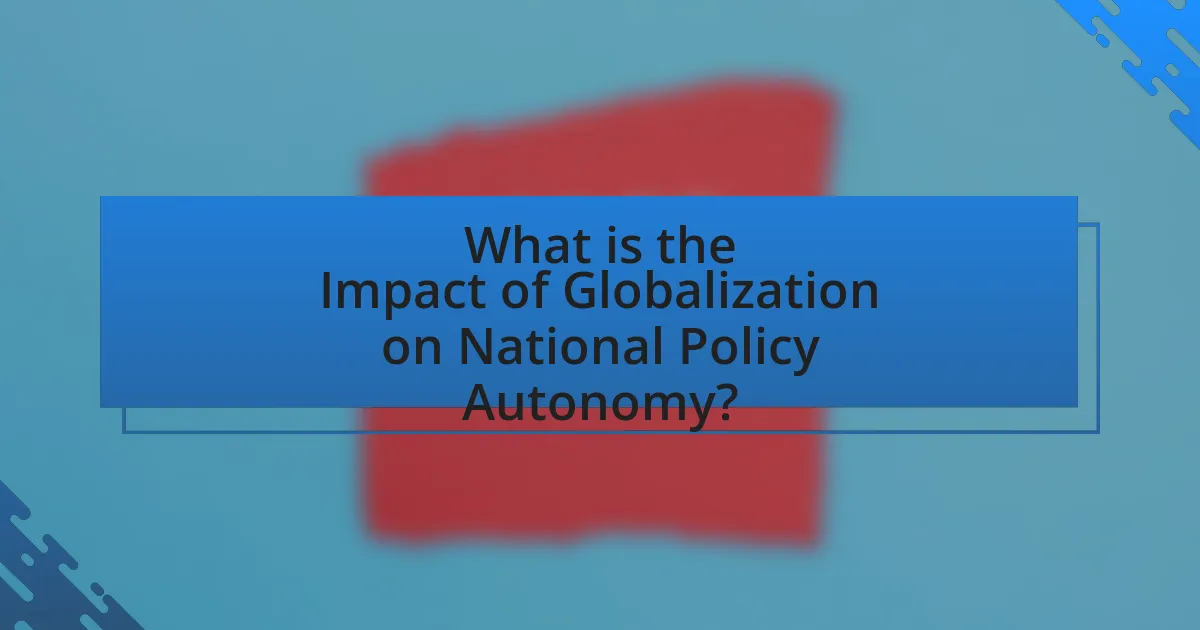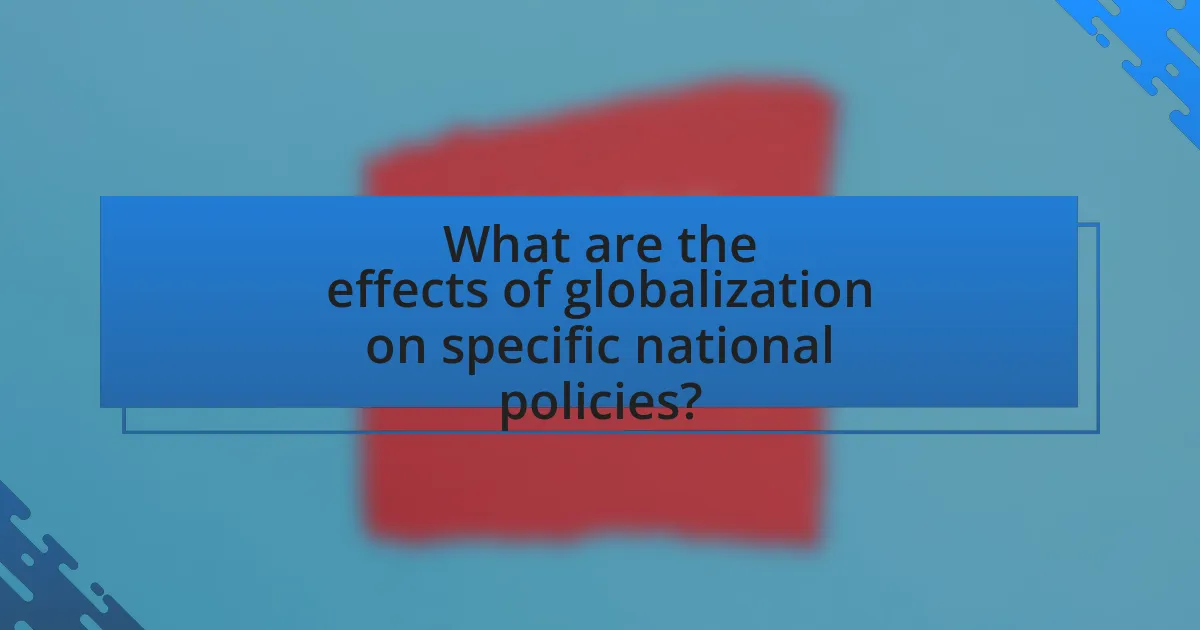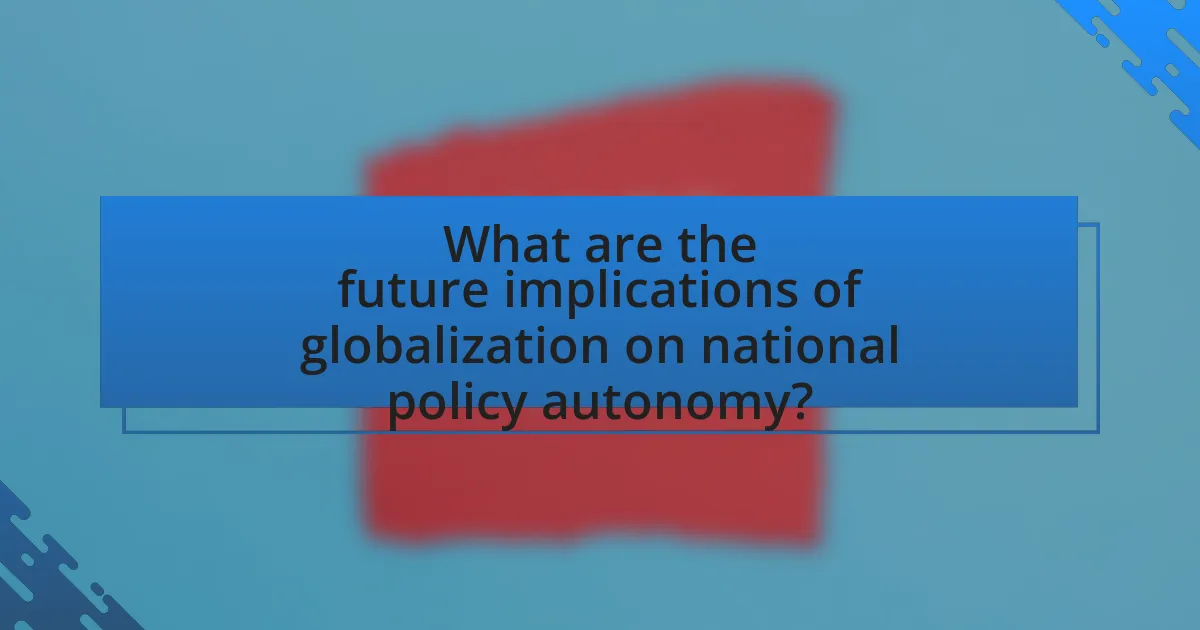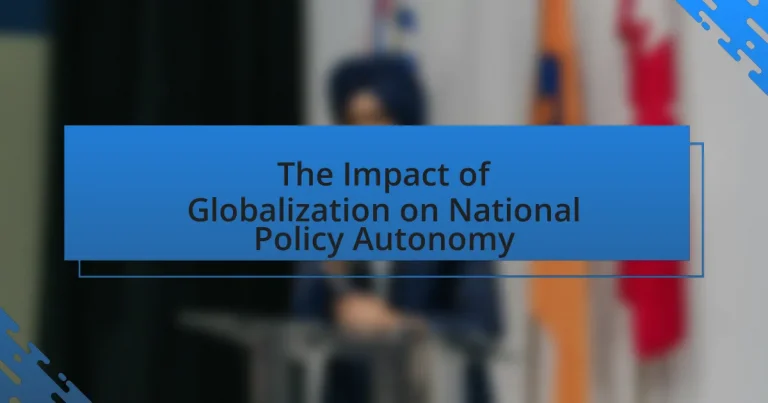The article examines the impact of globalization on national policy autonomy, highlighting how increased interdependence among countries constrains their ability to independently set policies. It discusses the influence of international trade agreements, economic interdependence, and multinational corporations on national policy decisions, emphasizing the challenges nations face in maintaining autonomy. Key factors such as regulatory convergence and the need for alignment with global standards are explored, along with the implications of reduced policy autonomy for national sovereignty and local governance. The article also outlines strategies for nations to balance globalization with policy autonomy, including protective trade measures and international cooperation.

What is the Impact of Globalization on National Policy Autonomy?
Globalization significantly reduces national policy autonomy by increasing interdependence among countries, which often leads to the adoption of policies that align with international norms and agreements. For instance, countries may alter their economic policies to attract foreign investment or comply with trade agreements, such as the North American Free Trade Agreement (NAFTA), which requires member states to adhere to specific trade regulations. This shift can limit a nation’s ability to independently set policies that reflect its unique social, economic, or political contexts, as seen in the European Union, where member states must align their regulations with EU directives. Consequently, globalization pressures nations to prioritize global competitiveness over local priorities, thereby constraining their policy-making flexibility.
How does globalization influence national policy decisions?
Globalization influences national policy decisions by increasing interdependence among countries, compelling governments to align their policies with international standards and practices. This alignment often occurs in areas such as trade, environmental regulations, and labor laws, where countries adopt similar frameworks to remain competitive in the global market. For instance, the World Trade Organization (WTO) sets rules that member countries must follow, which can limit national policy autonomy in trade-related decisions. Additionally, globalization fosters the spread of ideas and norms, leading to policy convergence as nations adopt successful strategies from one another, such as the adoption of renewable energy policies in response to global climate agreements.
What are the key factors of globalization affecting policy autonomy?
The key factors of globalization affecting policy autonomy include economic interdependence, international trade agreements, and the influence of multinational corporations. Economic interdependence limits a nation’s ability to implement independent fiscal and monetary policies, as global markets can react negatively to unilateral decisions. International trade agreements, such as NAFTA or the EU treaties, impose regulations and standards that member states must adhere to, thereby constraining their policy choices. Additionally, multinational corporations exert significant influence over national policies through lobbying and investment decisions, often prioritizing their interests over local governance. These factors collectively diminish the capacity of states to exercise full policy autonomy in a globalized context.
How do international agreements shape national policies?
International agreements shape national policies by establishing binding commitments that countries must adhere to, influencing domestic legislation and regulatory frameworks. For instance, trade agreements like the North American Free Trade Agreement (NAFTA) require member countries to align their trade policies with agreed-upon standards, thereby affecting national economic policies. Additionally, environmental agreements such as the Paris Agreement compel nations to implement policies aimed at reducing carbon emissions, which can lead to significant changes in energy and industrial regulations. These agreements often necessitate legislative changes to comply with international standards, demonstrating their direct impact on national policy formulation and implementation.
Why is national policy autonomy important in a globalized world?
National policy autonomy is important in a globalized world because it allows countries to tailor their policies to their unique social, economic, and cultural contexts. This autonomy enables nations to address local issues effectively, such as poverty alleviation, healthcare, and education, which may differ significantly from global trends or pressures. For instance, countries with strong policy autonomy can implement targeted economic strategies that reflect their specific needs, as seen in the varying responses to the 2008 financial crisis, where nations like Australia maintained robust economic growth through independent fiscal policies. Thus, national policy autonomy is crucial for preserving sovereignty and ensuring that globalization does not undermine local priorities and governance.
What are the implications of reduced policy autonomy for nations?
Reduced policy autonomy for nations leads to diminished control over domestic affairs, resulting in increased vulnerability to external pressures and influences. This loss of autonomy often manifests in the inability to implement tailored economic, social, or environmental policies that reflect the unique needs of a nation. For instance, countries may be compelled to conform to international trade agreements or financial regulations that prioritize global market stability over local interests. A study by the International Monetary Fund highlights that nations with reduced policy autonomy often experience slower economic growth and increased inequality, as they cannot effectively address local disparities. Thus, the implications of reduced policy autonomy include economic challenges, social unrest, and a potential erosion of national sovereignty.
How does policy autonomy affect a country’s sovereignty?
Policy autonomy significantly enhances a country’s sovereignty by allowing it to make independent decisions that reflect its unique interests and values. When a nation possesses policy autonomy, it can establish laws, regulations, and practices without external interference, thereby asserting its authority and control over domestic affairs. For instance, countries with strong policy autonomy can tailor their economic, social, and environmental policies to suit their specific contexts, which is crucial for maintaining national identity and governance. Historical examples include nations that have resisted external pressures from international organizations, thereby preserving their legislative independence and cultural integrity. This autonomy is vital for a country’s ability to navigate the complexities of globalization while safeguarding its sovereignty.
What challenges do nations face regarding policy autonomy due to globalization?
Nations face significant challenges to policy autonomy due to globalization, primarily through economic interdependence and regulatory convergence. Economic interdependence limits a nation’s ability to implement independent fiscal and trade policies, as global supply chains and foreign investment create pressures to align with international standards. For instance, countries may feel compelled to adopt similar labor or environmental regulations to attract foreign investment, which can dilute local policy preferences. Regulatory convergence occurs when nations adopt similar policies to facilitate trade and investment, often leading to a loss of unique national approaches. A study by the World Trade Organization indicates that over 80% of trade agreements include provisions that require countries to harmonize regulations, further illustrating the constraints on national policy autonomy.
How do economic pressures from globalization impact national policies?
Economic pressures from globalization significantly influence national policies by compelling governments to adopt market-friendly regulations and trade agreements. As countries integrate into the global economy, they face competitive pressures that often lead to deregulation, tax incentives, and labor market reforms aimed at attracting foreign investment. For instance, the OECD reported that countries that embraced globalization experienced a shift towards policies that prioritize economic liberalization, which can undermine local industries and labor protections. This trend illustrates how economic globalization can constrain national policy autonomy, as governments may prioritize international competitiveness over domestic welfare.
What role do multinational corporations play in shaping national policies?
Multinational corporations significantly influence national policies by leveraging their economic power and global reach. These corporations often engage in lobbying efforts to shape regulations that favor their interests, which can lead to policy changes in areas such as trade, labor, and environmental standards. For instance, a study by the International Monetary Fund in 2019 highlighted that multinational corporations can sway government decisions through direct investment and job creation, compelling nations to adopt favorable tax regimes or regulatory frameworks to attract and retain foreign investment. This dynamic illustrates how the economic clout of multinational corporations can lead to shifts in national policy priorities, often prioritizing corporate interests over local needs.
How can nations balance globalization and policy autonomy?
Nations can balance globalization and policy autonomy by implementing strategic trade agreements that protect local industries while engaging in international markets. For instance, countries can negotiate trade deals that include provisions for labor rights and environmental standards, ensuring that globalization does not undermine domestic policies. The European Union’s Common Agricultural Policy exemplifies this approach, as it supports local farmers while allowing for trade with non-EU countries. By prioritizing policies that promote economic resilience and social welfare, nations can maintain their autonomy in the face of global economic pressures.
What strategies can governments employ to maintain policy autonomy?
Governments can maintain policy autonomy by implementing protective trade measures, fostering local industries, and enhancing regulatory frameworks. Protective trade measures, such as tariffs and quotas, can shield domestic markets from foreign competition, allowing governments to prioritize local economic interests. For instance, the United States has employed tariffs on steel and aluminum imports to support its manufacturing sector. Additionally, fostering local industries through subsidies and incentives can strengthen economic independence, as seen in countries like South Korea, which invested heavily in technology and manufacturing sectors to reduce reliance on foreign entities. Finally, enhancing regulatory frameworks enables governments to set standards that align with national priorities, as demonstrated by the European Union’s General Data Protection Regulation, which establishes strict data privacy standards that member states must follow, thereby asserting their policy autonomy in the face of global digitalization pressures.
How can international cooperation support national policy autonomy?
International cooperation can support national policy autonomy by providing countries with access to shared resources, expertise, and frameworks that enhance their ability to implement independent policies. For instance, through international agreements, nations can collaborate on issues like climate change, trade, and health, which allows them to align their policies with global standards while retaining the flexibility to address local needs. This collaboration can lead to improved policy outcomes, as seen in the Paris Agreement, where countries commit to climate goals while maintaining the sovereignty to determine their own methods of achieving those goals. Such frameworks enable nations to navigate globalization’s challenges without sacrificing their policy-making independence.

What are the effects of globalization on specific national policies?
Globalization significantly influences national policies by promoting economic integration, regulatory harmonization, and the adoption of international standards. Countries often adjust their trade, labor, and environmental policies to align with global norms, which can lead to reduced policy autonomy. For instance, the World Trade Organization (WTO) agreements compel member nations to adhere to specific trade regulations, limiting their ability to impose tariffs or subsidies independently. Additionally, globalization encourages countries to adopt similar policies in areas such as labor rights and environmental protection to attract foreign investment, as seen in the European Union’s regulatory framework that harmonizes member states’ policies. This interconnectedness can result in a convergence of national policies, often prioritizing global competitiveness over local needs.
How does globalization affect economic policies?
Globalization significantly influences economic policies by increasing interdependence among nations, compelling governments to adapt their policies to remain competitive in a global market. This adaptation often leads to the adoption of free trade agreements, deregulation, and fiscal policies that favor foreign investment. For instance, the World Trade Organization (WTO) promotes trade liberalization, which encourages countries to reduce tariffs and barriers, thereby shaping national economic strategies. Additionally, countries may adjust their monetary policies to align with global financial trends, as seen during the 2008 financial crisis when many nations coordinated their responses to stabilize economies.
What changes occur in trade policies due to globalization?
Globalization leads to significant changes in trade policies, primarily by promoting liberalization and reducing trade barriers. Countries increasingly adopt free trade agreements and participate in international trade organizations, such as the World Trade Organization, which encourages the reduction of tariffs and quotas. For instance, the North American Free Trade Agreement (NAFTA) eliminated most tariffs between the U.S., Canada, and Mexico, demonstrating how globalization can reshape trade dynamics. Additionally, globalization fosters regulatory harmonization, where nations align their standards and regulations to facilitate smoother trade flows, further illustrating the impact of global interconnectedness on national trade policies.
How do labor policies adapt in response to global economic trends?
Labor policies adapt to global economic trends by implementing flexible regulations that respond to market demands and workforce dynamics. For instance, countries may adjust minimum wage laws, enhance worker protections, or promote skills training to align with the needs of a globalized economy. A notable example is the rise of gig economy regulations in various nations, which emerged in response to the increasing prevalence of freelance and contract work driven by technological advancements and globalization. According to a report by the International Labour Organization, over 30% of workers in some developed countries are now engaged in non-standard forms of employment, prompting governments to revise labor laws to ensure fair treatment and social security for these workers.
What impact does globalization have on social policies?
Globalization significantly influences social policies by promoting the convergence of standards and practices across nations. This process often leads to the adoption of similar social policies, such as labor rights and welfare systems, driven by international agreements and economic competition. For instance, the International Labour Organization’s conventions encourage countries to align their labor laws with global standards, resulting in improved worker protections in many regions. Additionally, globalization can pressure governments to reform social policies to attract foreign investment, as seen in countries that have adjusted their welfare systems to create more favorable business environments.
How do immigration policies evolve in a globalized context?
Immigration policies evolve in a globalized context through increased interdependence among nations, leading to the adoption of more flexible and collaborative frameworks. As countries face transnational challenges such as economic migration, security threats, and humanitarian crises, they often adjust their immigration policies to align with international norms and agreements. For instance, the Global Compact for Safe, Orderly and Regular Migration, adopted by the United Nations in 2018, encourages countries to cooperate on migration management, influencing national policies to become more inclusive and rights-based. Additionally, economic factors, such as labor shortages in developed countries, prompt governments to revise immigration policies to attract foreign workers, reflecting the dynamic nature of globalization.
What are the effects of globalization on healthcare policies?
Globalization significantly influences healthcare policies by promoting the convergence of health standards and practices across nations. This interconnectedness leads to the adoption of international health regulations, such as the World Health Organization’s Framework Convention on Tobacco Control, which encourages countries to implement similar policies to combat health issues. Additionally, globalization facilitates the flow of medical knowledge and technology, enabling countries to improve healthcare delivery and access. For instance, the spread of telemedicine has allowed remote areas to receive healthcare services, demonstrating how global advancements can enhance local healthcare systems. Furthermore, globalization can pressure national governments to align their healthcare policies with global market trends, potentially compromising local priorities in favor of international agreements.
How does globalization influence environmental policies?
Globalization influences environmental policies by promoting international cooperation and standardization of regulations. As countries engage in global trade and investment, they often adopt similar environmental standards to facilitate market access and competitiveness. For instance, the Paris Agreement, which aims to combat climate change, exemplifies how globalization encourages nations to align their policies with global environmental goals. Additionally, multinational corporations often drive the adoption of sustainable practices across borders, as they seek to maintain a positive global brand image. This interconnectedness can lead to the diffusion of innovative environmental technologies and practices, thereby shaping national policies to be more environmentally conscious.
What international agreements affect national environmental regulations?
International agreements that affect national environmental regulations include the Paris Agreement, the Convention on Biological Diversity, and the United Nations Framework Convention on Climate Change. The Paris Agreement, adopted in 2015, commits countries to limit global warming to well below 2 degrees Celsius, influencing national policies on emissions and climate action. The Convention on Biological Diversity, established in 1992, aims to conserve biological diversity, promote sustainable use of its components, and ensure fair sharing of benefits arising from genetic resources, thereby shaping national biodiversity laws. The United Nations Framework Convention on Climate Change, initiated in 1992, provides a framework for international cooperation to combat climate change, impacting national legislation on greenhouse gas emissions and climate resilience. These agreements create binding obligations and frameworks that guide countries in formulating their environmental regulations.
How can nations address environmental challenges in a globalized world?
Nations can address environmental challenges in a globalized world by implementing international agreements and fostering cooperation among countries. For instance, the Paris Agreement, which aims to limit global warming to well below 2 degrees Celsius, exemplifies how nations can collectively commit to reducing greenhouse gas emissions. Additionally, countries can share technology and best practices for sustainable development, as seen in initiatives like the United Nations Sustainable Development Goals, which encourage collaboration on environmental issues. This cooperative approach is essential because environmental challenges, such as climate change and biodiversity loss, transcend national borders and require coordinated global action to be effectively managed.

What are the future implications of globalization on national policy autonomy?
Globalization will likely reduce national policy autonomy by increasing interdependence among countries, leading to a convergence of policies. As nations become more interconnected through trade, investment, and technology, they face pressure to align their regulations and standards with international norms. For instance, the World Trade Organization (WTO) promotes trade liberalization, which can limit a country’s ability to impose tariffs or subsidies that protect local industries. Additionally, multinational corporations often influence national policies to favor their interests, further constraining governments’ autonomy. This trend is evident in the European Union, where member states must adhere to collective regulations that can override national laws. Thus, the future implications of globalization suggest a significant shift towards shared governance and diminished individual policy-making power for nations.
How might emerging trends in globalization affect policy autonomy?
Emerging trends in globalization can significantly reduce policy autonomy for nations. As countries become more interconnected through trade, technology, and cultural exchange, they often face pressures to align their policies with international standards and practices. For instance, the rise of multinational corporations can lead to regulatory harmonization, where nations may have to adjust their laws to attract foreign investment, thereby limiting their ability to implement independent policies. Additionally, global issues such as climate change and public health require coordinated responses, which can further constrain national policy choices. Research by the World Trade Organization indicates that countries engaged in extensive trade agreements often sacrifice some degree of policy flexibility to comply with trade rules, illustrating the tangible impact of globalization on national sovereignty.
What role will technology play in shaping future policies?
Technology will play a critical role in shaping future policies by enabling data-driven decision-making and enhancing communication between governments and citizens. The integration of advanced analytics and artificial intelligence allows policymakers to analyze vast amounts of data, leading to more informed and effective policy outcomes. For instance, the use of big data in public health has improved responses to crises, as seen during the COVID-19 pandemic, where data analytics guided resource allocation and public health strategies. Additionally, technology facilitates greater transparency and citizen engagement through digital platforms, allowing for real-time feedback and participation in the policymaking process. This shift towards a more participatory approach can lead to policies that better reflect the needs and preferences of the population, ultimately enhancing democratic governance.
How can nations prepare for potential shifts in global governance?
Nations can prepare for potential shifts in global governance by enhancing diplomatic engagement and fostering multilateral cooperation. Strengthening alliances through international organizations, such as the United Nations and regional bodies, allows nations to collectively address global challenges and adapt to changes in governance structures. For instance, the Paris Agreement on climate change exemplifies how countries can unite to tackle transnational issues, demonstrating the effectiveness of collaborative frameworks. Additionally, investing in domestic resilience—such as improving economic stability and social cohesion—enables nations to better navigate external pressures and shifts in governance. Historical examples, like the European Union’s response to economic crises, illustrate how coordinated policy responses can mitigate the impacts of global governance changes.
What best practices can nations adopt to enhance policy autonomy in a globalized world?
Nations can enhance policy autonomy in a globalized world by implementing strategic economic policies, fostering regional cooperation, and investing in domestic capabilities. Strategic economic policies, such as diversifying trade partnerships and reducing dependency on single markets, allow nations to mitigate external pressures. For instance, countries like South Korea have successfully diversified their trade relationships, which has strengthened their economic resilience.
Fostering regional cooperation through agreements that prioritize local interests can also enhance policy autonomy. The European Union’s emphasis on regional integration has allowed member states to collectively negotiate better terms in global trade, thereby increasing their bargaining power.
Investing in domestic capabilities, such as education and technology, empowers nations to innovate and reduce reliance on foreign expertise. Countries like Finland have demonstrated that strong investments in education lead to a more skilled workforce, enabling them to maintain greater control over their economic policies. These practices collectively contribute to a nation’s ability to navigate the complexities of globalization while preserving its policy autonomy.
How can countries effectively engage in international negotiations?
Countries can effectively engage in international negotiations by employing strategic diplomacy, fostering mutual understanding, and leveraging economic interdependence. Strategic diplomacy involves preparing thoroughly, understanding the interests of all parties, and establishing clear objectives. For instance, nations that prioritize relationship-building and trust often achieve better outcomes, as seen in the successful negotiations of the Paris Agreement on climate change, where collaborative efforts led to a global consensus. Additionally, fostering mutual understanding through cultural exchanges and dialogue can reduce tensions and facilitate compromise. Economic interdependence, illustrated by trade agreements like NAFTA, encourages countries to negotiate effectively, as they recognize the benefits of cooperation outweighing the costs of conflict.
What lessons can be learned from nations that successfully maintain policy autonomy?
Nations that successfully maintain policy autonomy demonstrate the importance of strategic economic diversification. For instance, countries like Norway and Switzerland have effectively utilized their natural resources and financial sectors to create robust economies that are less dependent on global market fluctuations. This approach allows them to implement policies that reflect national interests rather than external pressures. Additionally, these nations often invest in strong institutions and governance frameworks, which enhance their ability to resist external economic shocks and maintain control over domestic policy decisions. Historical examples, such as Norway’s management of its oil wealth through the Government Pension Fund Global, illustrate how prudent resource management can support long-term policy autonomy.





